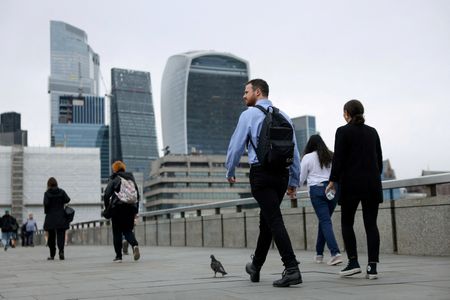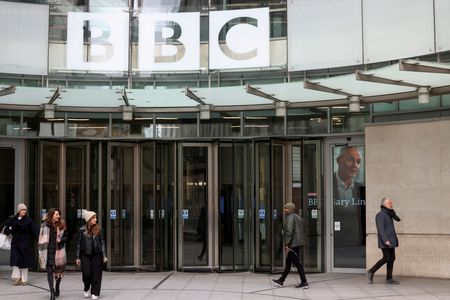By Suban Abdulla
LONDON (Reuters) -British employers expect to raise wages by 3% in the next 12 months, but some recruiters expect artificial intelligence to shrink their workforce, according to a survey that showed firms were worried about the impact of government tax plans on hiring.
The Chartered Institute of Personnel and Development, a professional body for the human resources sector, said overall hiring intentions were around the weakest since the pandemic, and were especially low in the public sector.
One in six employers expect the use of AI tools will allow them to reduce their headcount in the next 12 months.
Of those, a quarter expect the staffing reduction to be greater than 10%, with junior managerial, clerical, professional and administrator roles expected to be the most affected.
The CIPD said finance minister Rachel Reeves should avoid further measures that will dampen hiring in her November 26 budget, after she announced a big rise in employers’ social security contributions last year.
James Cockett, senior labour market economist at the CIPD, said people looking for jobs were already feeling the impact of slower hiring since Reeves’ first budget.
“We need to see a stronger focus by the government and employers on longer-term workforce planning and investment in skills to help people use AI effectively in their roles or transition into different jobs or occupations as AI use grows,” Cockett said.
The CIPD said that across the more than 2,000 businesses it surveyed, the median expected increase in staff basic pay was 3%, where it had been for six consecutive quarters.
A Bank of England survey of employers released on Thursday showed expectations for wage growth ticked higher to 3.7% in the three months to October, the highest reading for five months.
Official labour market figures are expected to show a small slowdown in wage growth on Tuesday. Economists polled by Reuters forecast regular pay in the three months to September to have increased by an annual 4.6%, slightly below the 4.7% rise in the month before.
British wage growth tends to be faster than growth in pay settlements, as the latter does not include gains made by workers who move to better-paid jobs.
Although the BoE held interest rates at 4% last week and signalled it could be on course to cut rates at its next meeting in December, it is still closely monitoring pay growth which could push up inflation.
The CIPD survey took place between September 19 and October 14.
(Reporting by Suban Abdulla; editing by David Milliken)











